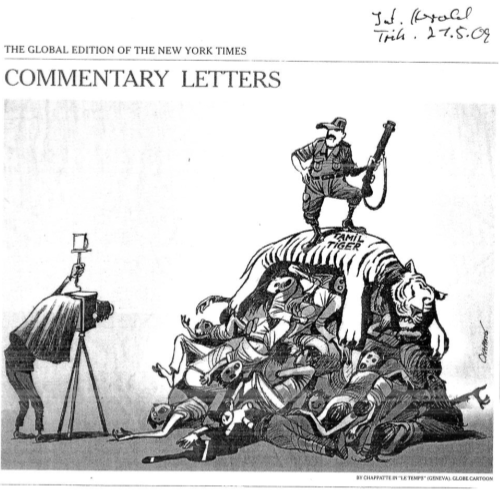Banned Arms' Use Caused High Casualties in Sri Lanka, Says Aid Worker
by Carol Glatz, Catholic News Service, May 22, 2009
|
Government forces recently launched a ground offensive in Vanni, bombarding areas with cluster bombs, cannons, multibarrel rocket launchers, and chemical and incendiary bombs such as Napalm and white phosphorous, the aid worker said...
He said the United Nations estimated that 6,500 people had been killed or injured in Vanni between January and March this year. But in just four days during the final offensive, medical staff and other people on the ground were reporting 25,000-30,000 people were killed or wounded, he said...
However, "there is an effort by the government to destroy evidence" of there having been so many civilian casualties, he said. |
(Editor's Note: References to the specific aid organization have been deleted at the request of the agency, which is trying to protect its workers.)
ROME (CNS) -- Sri Lankan government forces killed or injured 25,000-30,000 civilians in the span of just a few days during its final offensive against Tamil militants, said a humanitarian worker who just left the country.
The high number of casualties was caused by "a generous use" of weapons, such as cluster and chemical bombs, that are banned by international treaties and, therefore, their use represents a crime against humanity, he told Catholic News Service in Rome May 21.
Today the conflict zone of Vanni "is like a burial ground, nothing left behind, no buildings, no churches, utter destruction," he said.
 |
IHT, May 21, 2009 |
The aid worker said he could speak only on condition of anonymity because he was an eyewitness to numerous atrocities carried out against civilians in the battle zone.
He worked for an international humanitarian organization and had been serving in Sri Lanka's Vanni district for more than a decade until he fled in mid-May at the height of the Sri Lankan military assault against the last Tamil-held areas in northeastern Sri Lanka.
After a 26-year battle with Tamil separatists, the government declared victory May 19 after killing the rebels' top leaders.
Government forces recently launched a ground offensive in Vanni, bombarding areas with cluster bombs, cannons, multibarrel rocket launchers, and chemical and incendiary bombs such as Napalm and white phosphorous, the aid worker said.
Civilians weren't prepared for such a ground assault and didn't know how to find cover in time, he said.
"We were used to aerial attacks," he said, in which people could flee in time when they saw the aircraft flying overheard or heard the engines humming.
Being caught by ground artillery "was a deadly affair for the people because you never knew when and where" the munitions would explode, he said.
But the worst was "the use of forbidden weapons. We appealed to so many people, but nobody took notice of it because the government kept on denying" it was using such arms, he said.
"It's a terrible war, I say a crime against humanity," which should be brought to justice, he said.
He said the United Nations estimated that 6,500 people had been killed or injured in Vanni between January and March this year. But in just four days during the final offensive, medical staff and other people on the ground were reporting 25,000-30,000 people were killed or wounded, he said.
However, "there is an effort by the government to destroy evidence" of there having been so many civilian casualties, he said.
International aid groups including U.N. humanitarian agencies reported May 19 that they had only restricted access to several conflict zones.
"We lost all communication after May 18" with people within the Vanni conflict zone, and organizations like the one he worked for are no longer allowed freedom of movement in and out of camps sheltering the displaced, he said.
About 300,000 Tamil people have been displaced by the war.
The camps for the internally displaced are called "welfare centers," he said, but they are more like detention centers that are run and strictly controlled by the Sri Lankan military.
These camps are "a breeding ground of evil" because there is no transparency or accountability in how they are run, he said.
The people in the camps are in desperate conditions, he said, adding that the centers should be administered by unarmed, civilian workers.
"People are wounded, people have lost limbs, people are hungry, emaciated, malnourished" and tens of thousands of children receive little or no educational support, he said.
While the international community helps Sri Lanka provide urgently needed food, medical and other humanitarian aid, he said world leaders must also ensure material support is coupled with holding the Sri Lankan government accountable for possible human rights abuses perpetrated during the war.
He said the international community also must pressure the Sri Lankan government to enact concrete solutions to the root causes of the conflict, such as the widespread discrimination and prejudice against minority groups, especially the Tamil people. The Indian Ocean island is predominantly ethnic Sinhalese.
One concern, he said, is that many displaced Tamil people will be stuck in the welfare centers for many years to come. Many of them will have no land or homes to return to, he added.
He said reconciliation is possible either with a two-state solution or with one united country that grants and upholds equal rights for all ethnic and religious groups in Sri Lanka.
Aid agencies will need to concentrate much of their efforts on helping people cope with the suffering and trauma they have experienced for decades, he said.
Many of these people, especially the children, need professional help and assistance in finding hope for the future, he said.
It's imperative that pressure be put on the government to allow the displaced to return to what is left of their land or homes, he said, because even though seeing one's possessions destroyed may be painful, it still is a critical part of the healing process.
END
|
 Home
Home Archives
Archives